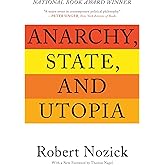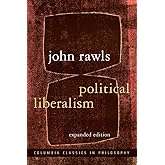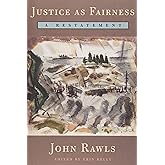
無料のKindleアプリをダウンロードして、スマートフォン、タブレット、またはコンピューターで今すぐKindle本を読むことができます。Kindleデバイスは必要ありません。
ウェブ版Kindleなら、お使いのブラウザですぐにお読みいただけます。
携帯電話のカメラを使用する - 以下のコードをスキャンし、Kindleアプリをダウンロードしてください。

A Theory of Justice: Revised Edition (Belknap) ペーパーバック – 1999/9/30
購入オプションとあわせ買い
“A milestone in political and moral philosophy, as groundbreaking as the theories of Bentham and Kant and arguably the most important and influential piece of contemporary philosophy of the last century.” ―The Guardian
The principles of justice that Rawls set forth in this book are those that free and rational people would accept in an “original position” of equality. In this hypothetical situation, which corresponds to the state of nature in social contract theory, no one knows their place in society; their class or social status; their fortune in the distribution of natural assets and abilities―their intelligence, strength, and the like―or even their conception of the good. Deliberating behind this “veil of ignorance,” people naturally determine their proper rights and duties. Thus, as Rawls writes, “each person possesses an inviolability founded on justice that even the welfare of society as a whole cannot override.”
Incorporating the ideas of Rousseau, Kant, Emerson, and Lincoln, Rawls’s theory is as powerful today as it was when first published in 1971. For more than half a century, A Theory of Justice has been taught and debated, celebrated and translated into more than thirty languages. This revised edition includes changes, discussed in the preface, that Rawls considered to be significant, especially to the discussions of liberty and primary social goods.
- 本の長さ560ページ
- 言語英語
- 出版社Belknap Press: An Imprint of Harvard University Press
- 発売日1999/9/30
- 寸法15.56 x 3.81 x 23.5 cm
- ISBN-100674000781
- ISBN-13978-0674000780
この商品をチェックした人はこんな商品もチェックしています
商品の説明
レビュー
“I don’t know of a more lucid articulation of the intuitions many of us share about what is just.”―Scott Turow, New York Times Book Review
“Impeccably high-minded in its goals, meticulous in execution, optimistic in its view of humanity…Rawls’s theory continues to provide both a compelling framework within which such basic principles can be debated, and a flexible but robust defence of liberal human values. That is a monumental achievement.”―Prospect
“A much-needed affirmation of a free, tolerant, and democratic society…at a time when individual freedom and democracy are under attack.”―The Nation
“Magisterial…John Rawls draws on the most subtle techniques of contemporary analytic philosophy to provide the social contract tradition with what is, from a philosophical point of view at least, the most formidable defense it has yet received…[and] makes available the powerful intellectual resources and the comprehensive approach that have so far eluded antiutilitarians. He also makes clear how wrong it was to claim, as so many were claiming only a few years back, that systematic moral and political philosophy are dead… Whatever else may be true it is surely true that we must develop a sterner and more fastidious sense of justice. In making his peerless contribution to political theory, John Rawls has made a unique contribution to this urgent task. No higher achievement is open to a scholar.”―Marshall Cohen, New York Times Book Review
“Rawls’s Theory of Justice is widely and justly regarded as this century’s most important work of political philosophy. Originally published in 1971, it quickly became the subject of extensive commentary and criticism, which led Rawls to revise some of the arguments he had originally put forward in this work… This edition will certainly become the definitive one; all scholars will use it, and it will be an essential text for any academic library. It contains a new preface that helpfully outlines the major revisions, and a ‘conversion table’ that correlates the pagination of this edition with the original, which will be useful to students and scholars working with this edition and the extensive secondary literature on Rawls’s work. Highly recommended.”―J. D. Moon, Choice
“[Rawls] has elucidated a conception of justice which goes beyond anything to be found in Kant or Rousseau. It is a convincing refutation, if one is needed, of any lingering suspicions that the tradition of English-speaking political philosophy might be dead. Indeed, his book might plausibly be claimed to be the most notable contribution to that tradition to have been published since Sidgwick and Mill.”―Times Literary Supplement
“Enlightenment comes in various forms, sometimes even by means of books. And it is a pleasure to recommend…an indigenous American philosophical masterpiece of the first order… I mean…to press my recommendation of [this book] to non-philosophers, especially those holding positions of responsibility in law and government. For the topic with which it deals is central to this country’s purposes, and the misunderstanding of that topic is central to its difficulties… And the central idea is simple, elegant, plausible, and easily applied by anybody at any time as a measure of the justice of his own actions.”―Peter Caws, New Republic
“With the simple carpentry of its arguments, its egalitarian leanings, and its preoccupation with fairness, Rawls’s classic 1971 work, A Theory of Justice, is as American a book as, say, Mark Twain’s The Adventures of Huckleberry Finn.”―Will Blythe, Civilization
著者について
登録情報
- 出版社 : Belknap Press: An Imprint of Harvard University Press; 第2版 (1999/9/30)
- 発売日 : 1999/9/30
- 言語 : 英語
- ペーパーバック : 560ページ
- ISBN-10 : 0674000781
- ISBN-13 : 978-0674000780
- 寸法 : 15.56 x 3.81 x 23.5 cm
- Amazon 売れ筋ランキング: - 33,366位洋書 (洋書の売れ筋ランキングを見る)
- カスタマーレビュー:
著者について

著者の本をもっと見つけたり、似たような著者を調べたり、おすすめの本を読んだりできます。
カスタマーレビュー
上位レビュー、対象国: 日本
レビューのフィルタリング中に問題が発生しました。後でもう一度試してください。
- 2016年6月14日に日本でレビュー済みAmazonで購入I like the power of morality. It is necessary to adhere to justice in order to protect the power of morality. Justice is a very nice power, morality is thought that it is a very good force. There is a basis and the power and membership that really want to help the human beings. Freedom will be protected fairness by justice. Justice is in the international organizations. We will do our best.
- 2003年12月23日に日本でレビュー済み政治哲学者ジョンロールズが社会正義について論じた本。社会(政府)が弱者を救済することに正義はあるのか?という根本的な問いに説得力のある思考実験を通じて答えを出してくれる良書である。人間が無知のベールにつつまれ、社会的なステータス、収入、資産、男女、健康状態などの自分に関するあらゆる状態を自分が分からない状態にいたら、人間は一体どんな決断をするだろうかという思考実験を通じて、真実の社会正義を探る。福祉国家の正当性によく持ち出される彼の議論は、国家政策の公平性を論じたい人には必須の書と言えよう。
他の国からのトップレビュー
-
 Marcio2024年11月28日にブラジルでレビュー済み
Marcio2024年11月28日にブラジルでレビュー済み5つ星のうち5.0 Obra prima
Amazonで購入O texto é excelente, um clássico que deveria ser lido por todos, independentemente de sua área de estudo ou atuação profissional.
O livro é novo, porém em estado de conservação não ideal (páginas amareladas e capa levemente amassada). De qualquer forma, recomendo, pois não é um livro fácil de encontrar no Brasil (para quem prefere a versão impressa).
-
 August Baker2024年4月21日にアメリカ合衆国でレビュー済み
August Baker2024年4月21日にアメリカ合衆国でレビュー済み5つ星のうち5.0 So much depends on it
Amazonで購入If you want to read modern philosophers, Martha Nussbaum, Timothy Williamson, Owen Flanagan, Daniel Dennett, etc etc., they all seem to employ concepts or frameworks from Theory of Justice in the background. That's my impression anyway. So in other words, the author and the book are brilliant. It's as fascinating a read as you would think.
-
 Chris Banks2023年5月2日に英国でレビュー済み
Chris Banks2023年5月2日に英国でレビュー済み5つ星のうち5.0 Monumental work of scholarship
Amazonで購入I am returning to this work after earlier studies whilst a student. Time has not diminished the power of the arguments and the brilliance of the writing. Rereading prompted by reading Free and Equal - Daniel Chandler ....a hugely influential book just issued and sure to be a classic amongst serious political thinkers. My goodness how we need some political honesty and competence - I am sickened by the political circus in government.
-
 Luis Fernandez2022年3月20日にスペインでレビュー済み
Luis Fernandez2022年3月20日にスペインでレビュー済み5つ星のうち4.0 Ambitious, but ultimately failed, attempt at laying the foundatios of moral an political philosophy
Amazonで購入In this book, John Rawls articulates an understanding of social justice. For Rawls, social justice refers to the basic principles that organize a society; these principles are just if they would be hypothetically chosen by the members of that society when they started from an initial position of equality and ignorance of their particular situation, interests and abilities (the original position). Moreover, he argues that this choice has a definite unique answer; the principles chosen would be (p. 266):
- P1: Each person is to have an equal right to the most extensive total system of equal basic liberties compatible with a similar system of liberty for all.
- P2: Social and economic inequalities are to be arranged so that they are both:
(a) to the greatest benefit of the least advantaged; (b) attached to offices and positions open to all under conditions of fair equality of opportunity.
By “fair equality of opportunity” it is meant that “those who are at the same level of talent and ability, and have the same willingness to use them, should have the same prospects of success regardless of their initial place in the social system.” (p. 63).
In order to interpret those principles, two priority rules need to be applied:
- P1 has priority over P2 and therefore the basic liberties can be restricted only for the sake of liberty: (a) a less extensive liberty must strengthen the total system of liberties shared by all; (b) a less than equal liberty must be acceptable to those with the lesser liberty.
- P2b is prior to P2a. An inequality of opportunity must enhance the opportunities of those with the lesser opportunity (p. 266).
Rawls then goes on to explore what type of society could implement these principles, finding that a constitutional democracy would be a possibility. In addition, he analyzes whether such society would be stable, in the sense of whether individuals in such society would acquire and benefit from having the proposed sense of justice. To this question he also answers in the affirmative, providing a number of developmental and psychological arguments.
The book is extremely ambitious, aiming at laying the ground of most moral and political philosophy. Unfortunately I believe that the text fails in this goal, since the arguments presented have many weaknesses and the conclusions found are unconvincing. Nevertheless, the book is an interesting read, since it is carefully written and thought-provoking (and indeed has been extremely influential).
The idea of the original position (OP) as a fundamental device to establish justice, while interesting, is nevertheless problematic. In the OP we are asked to think how we would reason if we did not know, not only our position in society, but also our interests and abilities, as well as the particular circumstances of our society (such as the level of civilization and culture). We are, however, assumed to know the general facts about human societies (principles of economics, politics and social organization, as well as human psychology, pp.118-119). It is clear that some of these stipulations are needed to ensure that our choices are not guided by narrow self-serving interests (which presumably have little to do with justice). However, by leaving aside any knowledge about ourselves it becomes unclear who is really choosing, and how we could make or accept that choice. It seems it would be some impersonal being rather than actual people. This becomes particularly problematic if we take Rawls’ Kantian interpretation of the OP whereby he claims that in the OP we express our nature as free an equal rational beings. The idea that in order to express our true selves we need to ignore everything about ourselves seems unsatisfactory. In addition, ignoring the particulars of our society can lead us to make unwise choices (the road to hell is paved with good intentions) or even make the choice itself meaningless.
The objections to the reasoning leading from the OP to the two principles are even more profound. The fundamental problem is that Rawls’ analysis in many ways ignores the moral significance of liberty. This contention might seem surprising, given that P1 (which has priority over P2) establishes a claim to “the most extensive total system of equal basic liberties”. The problem is that Rawls has a somewhat narrow notion of “basic liberties”. Basic liberties are to be given by a list, but are not exhaustively enumerated; it is noted, however, that the right to own certain kinds of property (eg. means of production) and laissez-faire freedom of contract are not included in the list; other arguably less fundamental liberties, such as political ones, are, however, included in the list. These choices seem somewhat arbitrary and are not justified. But it seems clear that Rawls’ notion of basic liberties is a relatively limited one. Note that it is this narrow notion of liberty that allows Rawls to propose P2, since P2 would be overridden by a more expansive notion of liberty. One could even say that Rawls presentation is misleading, since he often appeals to the priority of liberty (with the powerful emotional response which this term elicits), but only briefly notes that his notion is a rather constrained one. Without going as far as accusing Rawls of being misleading, we can certainly wish that he had discussed in more detail his notion of liberty, given the centrality of this concept in his theory, and consider this hole a serious deficiency of the book. Moreover, when initially arguing for P2, it is indicated that socioeconomic differences arising due to unequal endowments (be them family wealth and position or innate or acquired abilities) have no moral relevance, and it is therefore legitimate to eliminate them. It is overlooked, however, that those socioeconomic differences can be the result of the application of individual liberty. To the extent that liberty has moral value, those differences would seem to inherit that moral significance. In addition, the argumentation leading for the 2 principles mainly tries to show that they would be preferable to utility maximization. It seems surprising that Rawls does not consider, for example, the possibility that the parties might choose a more minimal set of principles, for example P1 alone (which could resemble Classical Liberalism, provided that an extensive enough notion of liberty is considered). Moreover, the arguments seem rather ad-hoc. For example, it is first argued that in the original position the agents don’t have particular interests (or are unaware of them), but they do value their liberties, therefore they would choose P1; this argument, however, seems to fall into the begging the question fallacy.
In conclusion, the book presents a stimulating articulation of fundamental political philosophy ideas. Even if it falls short of its (very ambitious) goals, it is still a work worth contending with.
-
 River2021年2月17日にフランスでレビュー済み
River2021年2月17日にフランスでレビュー済み5つ星のうち5.0 Une théorie essentielle
Amazonで購入Il s'agit selon moi d'un livre essentiel si on s'intéresse à la philosophie politique, car il propose une théorie complète de ce qu'est une société juste. C'est par ailleurs la référence si on s'intéresse à la philosophie social-libérale ou libérale de gauche.









